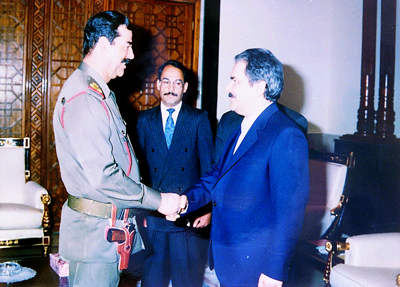|
Jeremiah Goulka, formerly a lawyer in the Bush Justice Department and former Iraq analyst for the RAND Corporation, recently sat down for an interview with The Real News Network to talk about the Mujahedin-e Khalq (MEK, a.k.a. MKO and PMOI) terrorist group, its past and present. |
 According to a report published by Habilian Foundation website, independent public policy scholar and writer Jeremiah Goulka said the MEK's leadership made a deal with Saddam Hussein, the starter of the Iran-Iraq War to “provide some soldiers, particularly providing some intelligence and interrogation of Iranian POWs.”
According to a report published by Habilian Foundation website, independent public policy scholar and writer Jeremiah Goulka said the MEK's leadership made a deal with Saddam Hussein, the starter of the Iran-Iraq War to “provide some soldiers, particularly providing some intelligence and interrogation of Iranian POWs.”
The analyst believes that in exchange for the Mujahedin-e Khalq’s services to Iraqi executed dictator, what it was going to get in the bargain were “weapons, some territory within Iraq and the power of Saddam's military, in their hope to install themselves as the new government of Iran.”
The lead author of The Mujahedin-e Khalq in Iraq: A Policy Conundrum described MEK’s siding with Saddam as “their biggest mistake,” because “the Iranian people saw them essentially as traitors by signing up with the instigator of that horrible war.”
“The MEK, you know, voluntarily crossed the border into Iran and fought against Iranian soldiers,” he added. “In fact, they launched an invasion after the ceasefire in that war.”
Denying MEK’s claims regarding their extensive support amongst Iranians, Goulka said “it’s not true, there’s no support for the MEK.”
When asked about the MEK remaining on the FTO during the Bush administration while it was promoting terrorists against Iran, Goulka said, “the government could—the Bush administration was able to keep—by keeping the group on the list, they have more of a negotiating point with the group. You know, it's a carrot to offer the group if they'll kind of play nicely.”
“When I was at the RAND Corporation and did my interviews for the report (The Mujahedin-e Khalq in Iraq: A Policy Conundrum), I spoke to dozens of U.S. officials, and the points of view varied,” he added. “The people who wanted to invade Iran saw the MEK as a potentially useful ally, in the sense of the enemy of my enemy is my friend.” “And there were several people who were sort of fooled by the MEK's excellent press relations that it's been doing since leaving Iran in 1981, where they have this thing called the National Council of Resistance of Iran, which is the political arm, which has been selling themselves as a liberal, democratic, human rights respecting organization that could go in and be the new—either be the new government or help create a new democracy in Iran.”
Asked if he had any evidence that MEK was not liberal, democratic, the American analyst underlined that what they have said in the RAND report that has been said by others, such as Human Rights Watch, is that “the group is actually is a cult”, adding that Massoud Rajavi married Maryam Rajavi, wife of one of his colleagues in the MEK (Abrishamchi), and the two of them “turned the group into something of a cult of personality.”
He went on to say that from a lot of former members he spoke to, “it appears that lots of them were actually duped into ending up at MEK camps—promises of jobs, wives, and help of getting asylum or residency rights in other European countries.” “So you have lots of people who have now been trapped in these Iraqi camps, MEK camps in Iraq, and have been enduring various forms of cult behavior, such as sexual control, thought control, brainwashing, limited access to other media, limited food, limited sleep, make-work projects.”
MEK’s big goal, Goulka believes, is to get into power in Iran, and to use the United States’ military to get that. For that purpose, they need to promote the fears of nuclear Iran, that’s why they first announced to the public the existence of the Natanz nuclear facility.
“You know, as a side note, then that information came to them, it appears, from the Israeli government, which wanted also to have this be put into the public arena, and the U.S. already knew,” added Jeremiah Goulka. “But the MEK's been waving the flag of fear about Iran since then.”
Finally, he pointed to the inequality in law enforcement in the United States and “the impunity that prominent powerful officials can enjoy”, saying if you're going to enforce material support law against Muslims in America, why would you not enforce it against prominent public officials?
